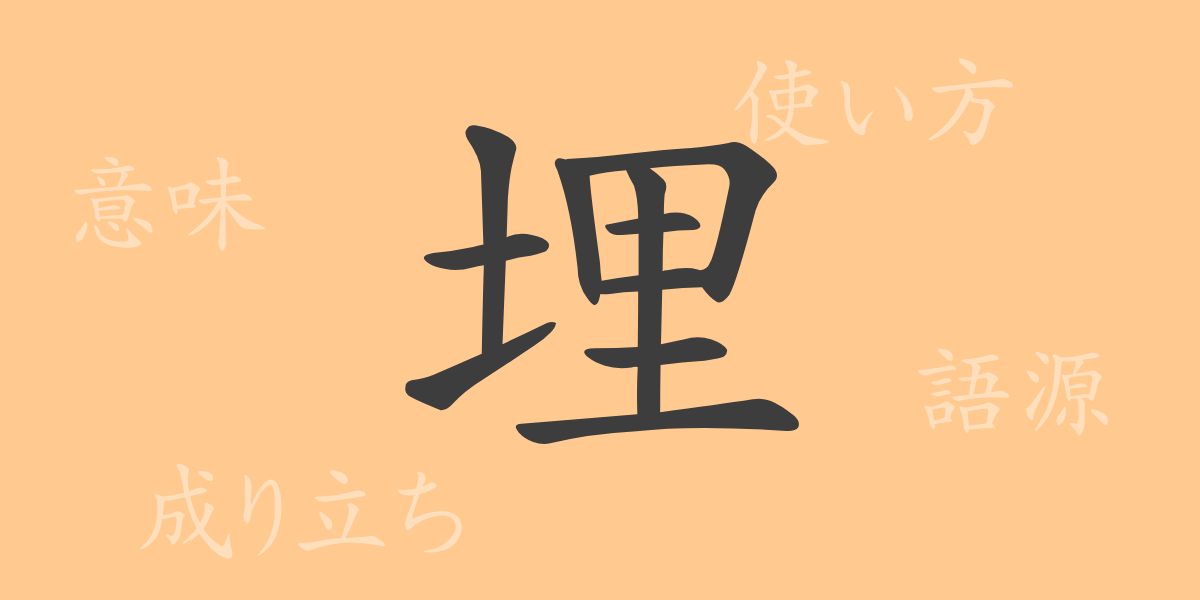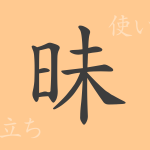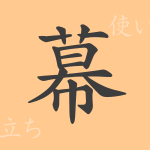The beauty of the Japanese language is reflected in its complex character system. Kanji (漢字) are at the core of this system, and the 常用漢字 (Jouyou Kanji), or “commonly used kanji,” are deeply rooted in the daily lives of Japanese people. This time, we will spotlight one of these 常用漢字 (Jouyou Kanji), “埋” (うめ), exploring its origin, meaning, usage, and even its compounds and idioms. Let’s rediscover the charm of kanji through the rich expressiveness of this single character.
Origin of 埋 (うめ)
The kanji “埋” (うめ) is formed by combining the radical for “earth” (土, つち) with the character “里” (さと), which indicates sound. “里” originally means a place where people live, and when combined with “土” (つち), it creates the meaning “to bury in the earth.” This character was used in ancient China for activities like land reclamation or burying objects underground, leading to its current meaning.
Meaning and Usage of 埋 (うめ)
“埋” (うめ) has basic meanings such as “to bury” (うめる), “to be buried” (うまる), and “to cover with earth” (うずめる). This can range from the literal act of burying something physically to metaphorical uses like “solving a problem” or “suppressing a memory.” In Japanese, this kanji allows for diverse expressions.
Readings, Stroke Count, and Radical of 埋 (うめ)
Understanding the readings and components of the kanji “埋” (うめ) helps deepen our comprehension of it.
- Readings: The on’yomi (音読み, おんよみ) is “マイ” (mai), and the kun’yomi (訓読み, くんよみ) includes “うめる” (umeru), “うまる” (umaru), and “うずめる” (uzumeru).
- Stroke count: “埋” (うめ) has 10 strokes.
- Radical: The radical is “つちへん” (つちへん, tsuchi-hen), meaning “earth.”
Compounds, Idioms, and Proverbs Using 埋 (うめ)
Compounds, idioms, and proverbs containing “埋” (うめ) are abundant in Japanese. Here are some examples along with their meanings:
- 埋葬 (まいそう, maisou): Burying the dead. A term used during funerals.
- 埋没 (まいぼつ, maibotsu): Something sinking and becoming invisible in the earth or water. It can also refer to talents being unrecognized by society.
- 埋め合わせ (うめあわせ, umeawase): Compensating for a loss or deficiency. It can also mean healing emotional wounds.
- 埋もれ木 (うもれぎ, umoregi): A tree buried and invisible in the earth. It metaphorically refers to hidden talents or valuable things.
- 時間を埋める (じかんをうめる, jikan wo umeru): Using spare time effectively.
Summary of 埋 (うめ)
The kanji “埋” (うめ) is deeply embedded in the Japanese language, both in form and meaning. From the physical act of “burying” to the psychological act of “compensating,” the range of expressions this single character offers is vast and indispensable in Japanese life. Through compounds and idioms, “埋” (うめ) is used to express more complex emotions and situations, making it one of the kanji that symbolizes the richness of the Japanese language.

























